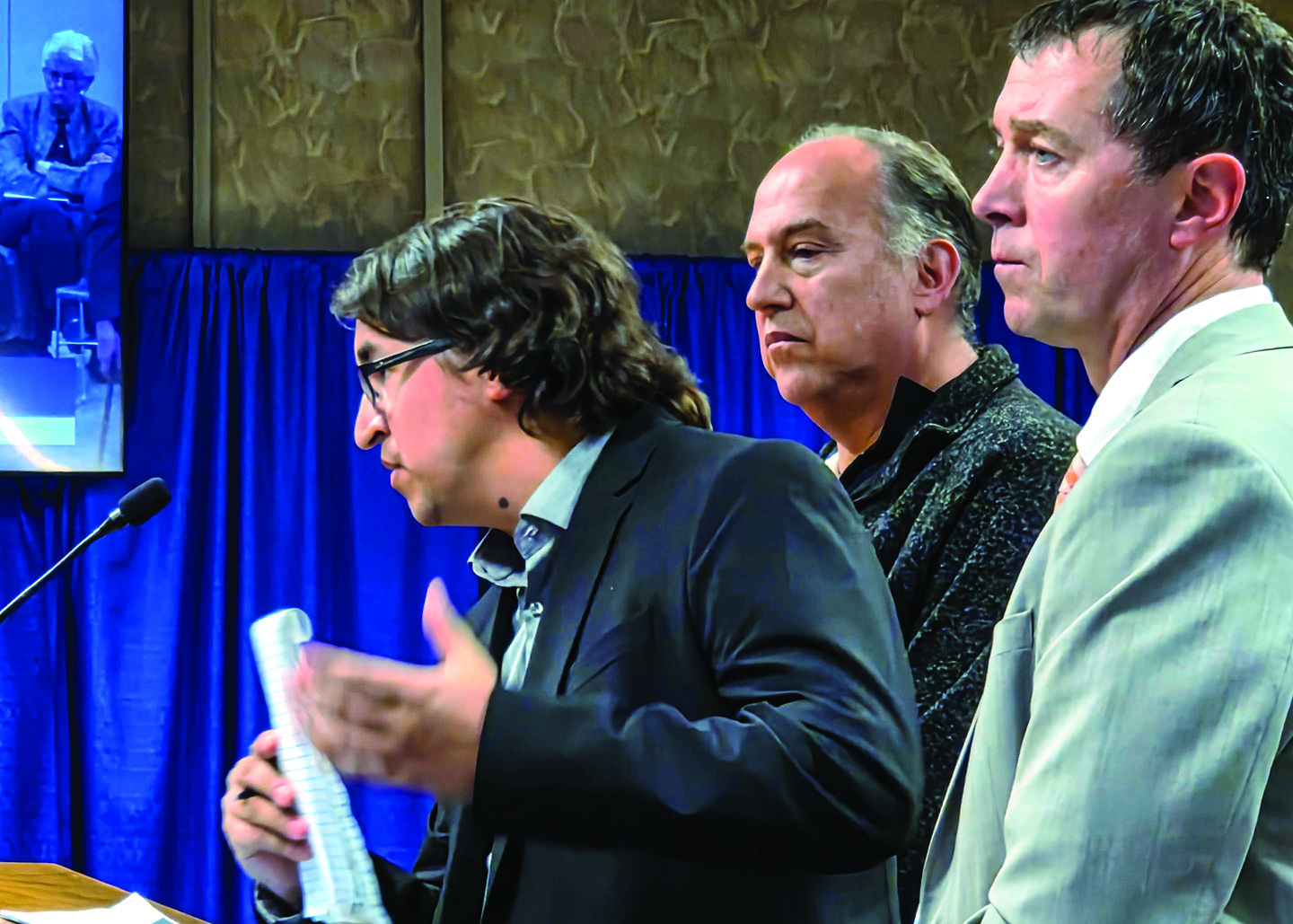
White Earth Nation land acquisition manager Jake Severson answers questions at Monday’s Moorhead City Council meeting. Tribal Council secretary-treasurer Mike LaRocque and Nate Larson of the tribe’s utility commission stand behind him. (Photo/Nancy Hanson.)
Nancy Edmonds Hanson
The White Earth Band of the Minnesota Chippewa Tribe brought its request for local support to the Moorhead City Council Monday, sharing preliminary plans for a casino, hotel and conference center complex on 280 acres of farmland purchased last October. No action was taken by the council at this time.
The site, located at the northwest corner of Interstate 94 and Highway 336, lies just north of the Moorhead Municipal Airport and across the interstate from the east edge of MCCARA Industrial Park, where DG Fuels has proposed building a $5 billion sustainable aviation fuels plant.
Mike LaRocque, secretary-treasurer of the tribal council, stressed the economic opportunities the proposed development would bring to Moorhead and Clay County as well as the tribal nation. “This is at a very, very interesting stage,” he said. “The concept is much more than gaming, with a large hotel, a convention center, employee housing, and possibly more. At this point, the sky’s the limit.”
LaRoque, the former public safety director at White Earth, added that many, many meetings lie ahead for the project, including at home: “We still have to have meetings with our own people.”
Nate Larson, director of the White Earth Utilities Commission, presented an overview of the project, much as he did before the Clay County Commission last week. The tribal nation is seeking letters of support from the county, Moorhead and Dilworth to accompany its application for the land to be placed in trust with the federal government for the tribe’s benefit. One effect of that status, if granted, would be to make it exempt from sales and property taxes. (According to the Clay County treasurer, 2025 taxes on the acreage amount to $18,344.)
“We intend to move forward with mutual cooperation, transparency and shared governance,” he said, “and observe local zoning, water, law enforcement and transportation concerns.” Negotiations, he said, would include working out agreements to the mutual satisfaction of the city, county and White Earth nation.
According to Larson’s overview, initial plans for the proposed casino-hotel complex includes a full-scale casino with Class 3 gaming, including an area of 90,000 to 110,000 sq. feet with between 900 and 1,200 slot machines and nine o 12 table games; a luxury hotel with 250 to 300 rooms; three dining options; convention space of 100,000 to 120,000 square feet; and 500 permanent jobs with an annual payroll of about $23 million. Employee housing is also part of the vision. A truck stop or convenience store also also potentially part of the development, he said.
Three citizens shared comments before the presentation. John Winter and Ed Dorset, both Glyndon Township supervisors, expressed concern over the loss to the county’s tax base. Winter asked the city to require environmental and economic impact studies and a review of crime statistics in Mahnomen since the opening of the Shooting Star Casino 34 years ago.
The property purchased by the White Earth Band is situated in Glyndon Township, though it’s expected to be annexed by Moorhead. The township board has already passed a resolution opposing the casino-hotel complex.
Moorhead attorney Zenas Baer, who served as general counsel to the White Earth Band in the late 1900s and early 2000s, had a different point of view. “Criticism of the tribe is unwarranted. Think of this as a business coming in with a new business proposal,” he said. “Would you ask Titan Machinery, say, for a crime study?”
He added, “Don’t be afraid of the White Earth Band just because they are exercising the sovereignty rights give by Congress and supported by the Supreme Court.”
Jacob Syverson, the band’s land acquisition manager, explained the process for securing status, the first step in moving forward: “There are 18 steps in the trust process along – a lot of stress on the NEPA side.” (NEPA, the National Environmental Policy Act, requires federal agencies to assess the environmental impacts of their projects, including those related to Indian gaming.) He estimated the request would take 18 to 24 months, including submitting files of 300 to 400 pages. “All levels of government are kept informed every step of the way.”
City council member Sebastian McDougall asked whether it would be feasible to put only a portion of the property into trust initially, then adding the rest as needed. Syverson replied, “That’s a possibility.”
In response to a question from the council, he conceded that the band does not need the letters of support they are requesting to move forward with its request to put the land in trust. “We hope to make application after receiving your support,” he said. “It’s possible to do so without notifying any local governments, but your support would be much appreciated.”


